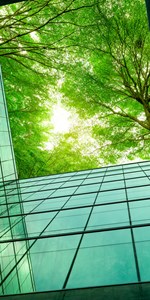Just before the summer, the Association drew up a manifesto. Together with Schoonmakend Nederland and NIVRE, the Association wants sustainable damage repair to be commonplace by the end of 2024. How far along are insurers? What do they do? What can they do? In a series on sustainable damage repair, various insurers have their say. In this second part the story of Midglas.
It's busy at the control room of De Glaslijn. At 11 o'clock on a weekday morning, more than eighty damage reports have already been received. In addition, all eight employees are in talks. Jurgen Quaars, director of Midglas, points to the notice board. "Three lines are coming in again." De Glaslijn is the claims department and the beating heart of glass insurer Midglas, which is located in a quiet shopping street in Breda.

Advertising campaign
Quaars gives a tour of the office. He is visibly proud of his company. Here and there in the building there are advertisements on the windows. Midglas is on the eve of an advertising campaign and the message is clear: Sustainable recovery is no longer an option.
"About a year and a half ago, we started our sustainability project. Together with the University of Amsterdam, we conducted extensive research. And we looked at ourselves first and foremost."
Quaars says it almost nonchalantly, but both De Glaslijn and Midglas are already almost CO2 neutral. For 2024, a positive handprint is the goal.
Sitting still is not an option
Quaars is tried and tested in the insurance industry, especially as an intermediary in the business market. Eight years ago, he was asked to become director of Midglas. He has been in his current position since 2016. He is hugely motivated to work towards sustainable recovery. "Why? Do you want to know my personal or my business motivation? Personally, I am intrinsically motivated to leave the world in a good place for the new generation. I also see that drive in our employees. Both with my younger and older colleagues. Sustainability is alive and well. We may be small, but as a niche player, we can make a lot of impact. From a business point of view, I see sustainability as a must. We want to lead the way and motivate others. It is not for nothing that we emphasise that sitting still is not an option. Development is the only way to go."
About Midglas
Midglas is the market leader in glass insurance. The company insures the glazing of buildings of: 1. housing corporations; 2. municipalities; 3. Owners' Association; 4. SMEs/hospitality; 5. real estate and 6. Individuals.
In total, Midglas has insured around 920,000 addresses in the Netherlands against glass breakage. Such as the luxury residential tower Zalmhaven on the Maas in Rotterdam, the tallest building in the Benelux. Midglas and De Glaslijn employ 39 people.
Housing corporations
It sounds so simple: keep up with the times, but how do you do that? "By going the extra mile," Quaars replies. "Of course, that's not always easy in practice, but let's not make it more difficult than it is. The housing corporations are a big segment for us. And it won't surprise you, but highly insulating glass is a hot topic for them. Wouldn't it be very strange if we replaced a single pane of glass with a new single pane in the event of damage? That's really outdated."
Sustainable recovery as standard
For some time now, Midglas has been replacing some panes of glass with insulating glass, but from 2024 onwards, sustainable repair will become the standard for housing associations. Quaars: "This sustainable recovery consists of three pillars. The first concerns our national recovery network. By 31 December, all repairers in that network must be certified green. In other words, they must comply with the Green Done quality mark. The second pillar consists of an upgrade to insulating glass. If a damage needs to be repaired, an upgrade from low-efficiency glass to high-efficiency (HR ++) takes place as standard. And finally, we use circular glass as much as possible."
 Jurgen Quaars, director of Midglas
Jurgen Quaars, director of Midglas
Shortage of circular glass
Circular glass is about fifty percent less polluting than ordinary glass, Quaars explains. Unfortunately, the supply is still small at the moment, especially from abroad. "We mainly have to rely on the Dutch market, because large foreign glass manufacturers do not find circular glass interesting enough. Together with housing corporations, we are going to help the Dutch glass industry by collecting 'old' glass for circular processing. For the time being, that is not enough to complete the 45,000 windows that we repair every year in a circular way, but fortunately developments are going fast."
Municipal Sustainability Scheme
Midglas is the market leader in glass insurance and would like to remain so. But Quaars' mission goes a little further. He wants to make Midglas a full-service provider. "For example, we are the glass partner of the Municipal Sustainability Scheme. When private individuals want to make their homes more sustainable at the municipality's expense, we provide the new, sustainable glassware with our partner MainPlus ."
If it is up to Quaars, Midglas' national network will also be used for other parties. For example, for colleagues in the insurance market. "We are already acting as a reinsurer and repair partner for other insurers, who are unable to offer national coverage. A few more could be added. After all, why should we, as a sector, constantly have to reinvent the wheel? Another insurer can easily take care of the insurance themselves, we will arrange the sustainable repair of the window damage. In this way, we can make even more impact together.
Big vs. Small
With 39 employees, Midglas is a small insurer, but it is remarkably active. For example, the company is affiliated with the Insver Foundation, an association that stands for sustainability in the insurance industry. "We want to learn from others, but we also want others to learn from us."
In addition, managing director Jurgen Quaars is active within the Association, including in the Platform for Small and Medium-sized Companies. His colleague Ian van Veen (Business Development Manager) is a member of the Sustainable Damage Insurance Communication working group. Quaars calls this involvement logical. "Large companies have a department for sustainability. Small insurers don't. The need for cooperation is therefore great. You won't hear me say that the big ones should take the small ones by the hand, because the same goes the other way around. We are practical, have short lines of communication and just do it. A small club can make bigger strides than a big club. With our sustainable damage repair for housing associations, for example, we are taking quite a risk. Sustainability costs money and we only settle part of that in the premium. Of course, we monitor that process and make adjustments if necessary, but all in all it's quite exciting."
Was this article useful?


